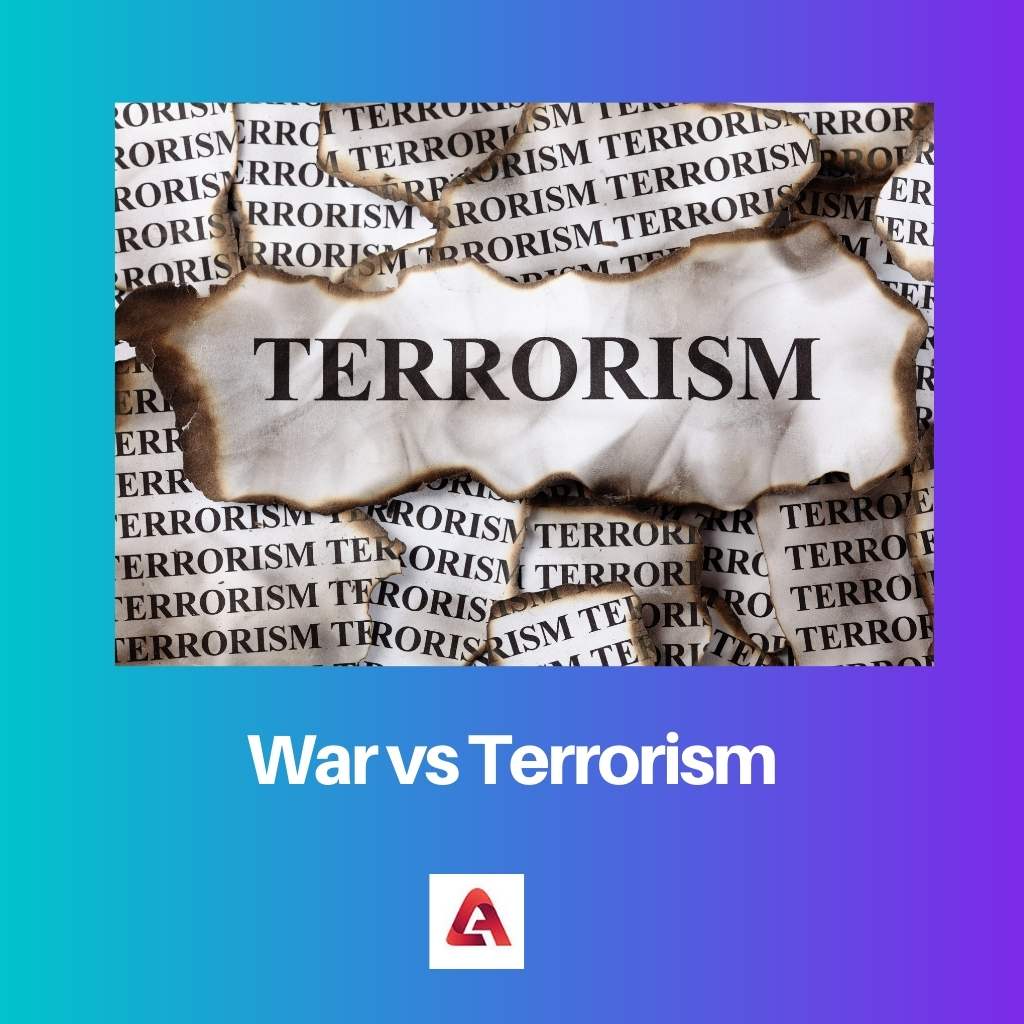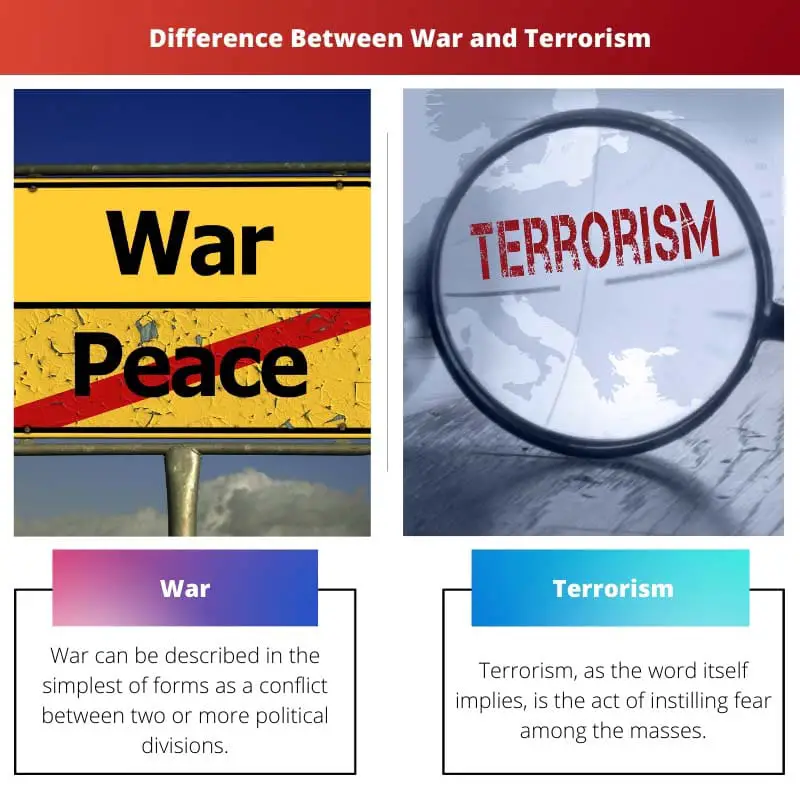War and terrorism are both acts of violence or any action that disturbs the peace and ambience of a limited or large geographical area.
While wars and terrorism have very different reasons, the outcome of both is fear, hatred, injury and death. The difference between the two, however, can be discussed as follows.
Key Takeaways
- War is a conflict between two or more countries, while terrorism is an act of violence by individuals or groups to achieve political goals.
- War is a legal and recognized form of conflict, while terrorism is illegal and condemned worldwide.
- Military forces fight a war, while non-state actors carry out terrorism.
War vs Terrorism
War is a state of armed conflict involving the use of military force to achieve political or territorial goals. Terrorism is the use of violence against civilians for political or ideological reasons, by non-state actors, to instill fear and disrupt social and political order.

War can be described in the simplest of forms as a conflict between two or more political divisions or units to display and acquire territory and achieve the state of the upper hand among the participating members of the conflict or war.
It is a large-scale physical or non-physical state of a clash between two parties.
Terrorism, as the word itself implies, is the act of instilling fear among the masses. It is a form of physical and non-physical conflict among people, localized in areas with an agenda of instilling fear among the opposed and oppressed.
Here there is no distinct political party that is the member of the conflict.
Comparison Table
| Parameters of Comparison | War | Terrorism |
|---|---|---|
| Type of Conflict | War is an organized form of conflict. | Terrorism is an unorganized form of conflict. |
| Duration | War takes place for a long period. | Terrorism is short-lived. |
| Participants | War is fought between two political communities. | Terrorism can involve both political and religious communities. |
| Area of Impact | War has a larger area of impact. | Terrorism has a limited area of impact. |
| Reason of Conflict | War is fought to acquire territory. | Terrorism is enforced to create fear. |
What is War?
War can be defined as an organized form of physical or non-physical, tactical, biochemical, mental or even psychological form of conflict between two participating members.
War necessarily does not mean the use of armed men. It can also mean a nuclear war or also just a cold war between nations.
The reason for war is always multifold. A large number of reasons compiled together makes it large enough for governments to declare war between themselves or that with other nations.
Whatever the reason, war is always formally recognized and declared by the waging government and the one facing it.
The main objective of war is to acquire power by acquiring territory. This is not the only objective of war.
A war can also be fought for a humanitarian crisis, but once a government loses a war, its territory is taken by the victor and governed under its name and rules.
The participants of a war are trained in military tactics and operations. They make use of military technology and apparatus and are approved by the government as soldiers.
They may also include the navies, border security forces or pilots. No civilian takes part in a war unless recruited and approved by the government.

What is Terrorism?
Terrorism or a terrorist attack can be defined as an unorganized and unexpected form of physical or non-physical, tactical or even psychological form of conflict between members of the same nation or adjoining ones.
In almost all cases, terrorist attacks are destructive to public property and are physically fought.
The reason for a terror attack is not always religion, in contrast to the common notion. The reason for terrorism can also stem from political or ideological differences and detest between the attackers and the civilian.
The group causing terrorism are called the terrorists. A terrorist can be a single person or a group of like-minded people joined together to bring enforcement to their ideas by causing fear and oppression among the common people.
Usually, the participants of a terror attack are powerful people who have acquired power through political association or acquiring weapons and vehicles illegally.
The participants of a terror group are not recognized and approved by the government but are always considered rogue.
Usually, the area of effect of terrorism is limited to a narrow geographical area in comparison to a war that has a wider reach. However, a war has less public property damage than a terror attack.

Main Differences Between War and Terrorism
- Wars are planned and executed by political entities of entire nations, while terrorism is sudden and unexpected.
- Wars are fought by trained military personnel, while terrorist groups can be joined by any commoner sharing the same ideology or even people who are forced to join terror groups.
- Wars last for a longer period than terrorist attacks.
- Wars have a higher death ratio than a terrorist attacks which has a higher loss of public property and heritage.
- Wars do not have oppressive humanitarian objectives, while terrorism can result in such.
- Wars are declared while terrorism is not declared.

This type of comparison is always necessary to really understand how both situations differ. It’s important to really understand these concepts.
Yes, I agree. This analysis shows how war and terrorism are not the same thing, despite both involving violence.
This article presents detailed insights that provide a comprehensive understanding of the fundamental differences between war and terrorism.
Absolutely, the depth of knowledge shared here enhances comprehension of these critical issues.
The clear and concise comparison offers an enlightening perspective on these complex matters.
Indeed, it’s crucial to understand these distinctions to address them effectively.
This thorough analysis is truly an enlightening read, providing valuable insights into the distinct nature of war and terrorism.
Thank you for this informative perspective on such important matters.
This article provides a detailed comparison that is educational for everyone to better comprehend the complexities of these issues.
The in-depth comparison does an excellent job of clarifying these complex topics.
I appreciate the insightful approach taken to convey the nuanced differences between war and terrorism.
Absolutely, the article offers valuable knowledge and encourages thoughtful consideration of these issues.
This detailed explanation helps to differentiate two major conflicts in today’s world and comprehend their severe consequences.
Agreed, these are important distinctions that need to be understood.
Yes, understanding the differences between war and terrorism can help shape better policies and responses.